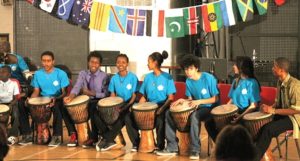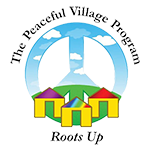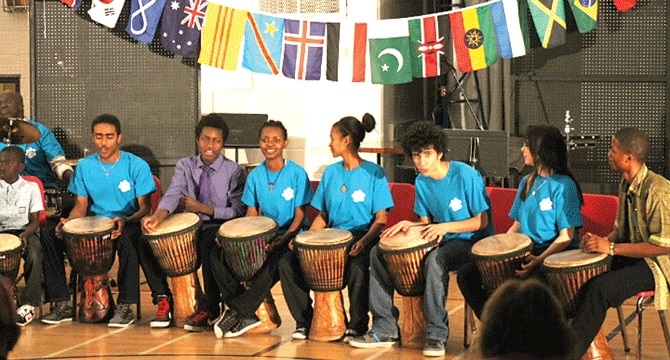
The Peaceful Village program was born out of a participatory action research project conducted in 2009 by the Manitoba School Improvement Program (MSIP) to identify the barriers that were impacting former refugee families in two school communities. As MSIP consultant, I spoke with parents, youth, settlement service providers, community leaders, teachers, administrators, and representatives from Manitoba Labour and Immigration. The action research process yielded profound results. The program’s mission, key activities, and evaluations are directly connected to the testimonials given by the families and community leaders during the action research phase. We learned that inquiry processes can build coalitions of committed and passionate community and school advocates who are able to work in solidarity to reduce the “push-out” rates of former refugee youth in high schools.
Arts-based learning helps us to think more deeply about who we are in the world and the ways in which we are sometimes marginalized by other people or systems. In fact, powerful artworks can compel us to see the world as it is, and then incite us to work towards a more just and joyful future. We invite all Peaceful Village participants to use their wisdom, deeds, beats, and words to make their lives and their communities works of art.
In The Peaceful Village program we also use the language of the theatre to address challenges that cause some of the difficulties in our lives. The students play theatre games, put on plays in the wider community, and invite audience members to wrestle with shared dilemmas.
We are committed to building assets across families. Each of The Peaceful Village sites operates a “Learning Centre,” which students and parents both attend to access tutoring and mentoring supports. Over 84 percent of the youth participants receive an additional 15 instructional hours per week. On Saturdays, parents and grandparents can gather together for three hours to work on their own literacy development goals. Children often learn new languages more quickly than their parents, so many newcomer children act as interpreters and liaisons for the family. This gives too much power to the children and undermines the leadership capacity of the parents. Therefore Peaceful Village staff members work hard to ensure the parents are able to access the settlement and literacy supports they need in order to be successful.
Each month we host Village Kitchens to provide parents with another opportunity to advocate for their children’s education and to build relationships with other families in their school community. Interpreters are available to break down communication barriers. On average, there are over 150 parents and children who attend each community feast.
The Peaceful Village program is committed to youth empowerment and mentorship. A number of our junior community development tutors are graduates of the program. Just like our senior staff, all of our junior staff are multilingual and understand the unique challenges facing former refugee youth in Canadian public schools.
Each Peaceful Village site has a youth leadership team that is responsible for ensuring students’ voices legitimately inform program planning and evaluation. Students collaborate with staff to assess the effectiveness of their tutoring supports in relation to their successes and challenges in their school subjects.
In Canada, public schools are one of the few social institutions where children, adolescents, and adults have the potential to gather together to become living expressions of the codified dreams and judgments about what constitutes the “good life.” They are places where students and families share a myriad of experiences that promote both community renewal and the individual questioning of the status quo. It is imperative that former refugee families are given the opportunity to influence the method and matter of education in their new communities.
News Source:

